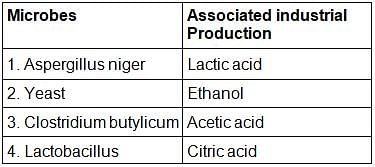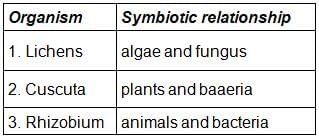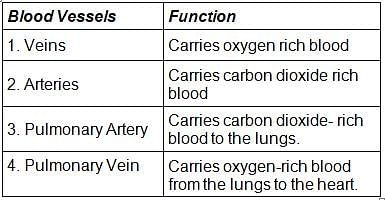Test: Science and Technology -1 - UPSC MCQ
30 Questions MCQ Test - Test: Science and Technology -1
‘Diazotrophs’ is a term used for which of the following?
Consider the following statements about Viruses:
1. It reproduces only inside the cells of the host organism.
2. It has the potential to infect either bacteria, plants or animals.
Which of the statements given above is/are correct?
With reference to ‘Manures’, which of the following statements is incorrect?
Which of the following sets of pair(s) is/are correctly matched?

Select the correct answer using the code given below:
Consider the following statements:
1. For pasteurization, the milk is heated and then suddenly chilled and stored.
2. Pasteurised milk can be consumed without boiling as it is free from harmful microbes.
Which of the statements given above is/are correct?
With reference to nitrogen gas, consider the following statements:
1. Although nitrogen is a dominant gas in the atmosphere, it is inert and does not react.
2. When it is released as a part of compounds from agriculture, sewage and biological waste, it becomes reactive.
3. It is an air pollutant as well as a greenhouse gas.
Which of the statements given above is/are correct?
Which of the following sets of pair(s) is/are correctly matched?

Select the correct answer using the code given below:
With reference to Stratospheric Observatory for Infrared Astronomy (SOFIA) mission , consider the following statements:
1. It is a joint program between NASA and the German Aerospace Centre (DLR) .
2. It was designed to observe cosmic objects in far-infrared wavelengths.
3. It discovered water molecules (H2O) on the sun-facing side of the Moon
Consider the following statements:
1. Starch is broken down into sugar in the mouth by an enzyme called ‘amylase’.
2. Proteins are broken down into simpler substances by digestive juices in the stomach.
Which of the statements given above is/are correct?
Which of the following correctly explains the term ‘Biopiracy’?
Consider the statements regarding ‘Pseudopodia’:
1. They are present in organisms or cells for the purpose of ingestion.
2. White Blood Cell is an example of pseudopodia.
Which of the statements given above is/are correct?
Consider the following statements:
1. Azospirillum and Azotobacter are fungi that can fix atmospheric nitrogen while free living in the soi.
2. Anabaena and Nostoc serve as important biofertilizers.
Which of the statements given above is/are correct?
Consider the following statements:
1. The Periodic Table is arranged according to similar chemical properties only.
2. ‘Dmitry Mendeleev’ published the first Periodic Table.
Which of the statements given above is/are correct?
In the context of innate immunity of the human body, which of the following best describe the term ’Interferons’?
Consider the following statements regarding Bt toxin:
1. It forms protein crystals which contain a toxic insecticidal protein.
2. If ingested by an insect leads to swelling of cells and ultimately leads to death of the insect.
Which of the statements given above is/are correct?
Which of the following is the correct sequence of development of an embryo?
With reference to Tissue Culture Plants in India, consider the following statements:
1. Plant seeds are cultured under controlled conditions of light, temperature, and humidity.
2. Netherland is the highest importer of tissue culture plants from India in 2021.
Which of the statements given above is/are correct?
Consider the following statements about respiration:
1. ‘Cellular respiration’ takes place in single- celled organisms only.
2. When the food is broken into carbon dioxide and water using oxygen, it is called ‘Aerobic Respiration’.
3. When the food is broken into carbon dioxide and water without oxygen, it is called ‘Anaerobic Respiration’.
Which of the statements given above is/are correct?
In the context of microbes acting as biocontrol agents, consider the following statements:
1. Bacillus thuringiensis (Bt) can be used to control butterfly caterpillars.
2. Trichoderma can be used for attacking insects and other pests.
3. Baculovirus can be used for the treatment of plant diseases.
Which of the statements given above is/are Correct?
Consider the following statements:
1. Endocrine glands are ductless glands that release hormones directly into the blood.
2. The production of testosterone is under the control of another hormone secreted by the pituitary gland.
Which of the above statements given above is/are Correct?
With reference to the function of blood in human body, consider the following statements:
1. It transports digested food from the small intestine to the other parts of the body.
2. It carries oxygen from the lungs to the cells of the body.
3. It transports waste for removal from the body.
Which of the statements given above is/are Correct?
With reference to the ‘Kalamsat-V2’ satellite launched by ISRO, consider the following statements:
1. It is the first satellite to use the fourth stage (PS4) of Polar Satellite Launch Vehicle (PSLV) as an orbital platform.
2. It was developed by ISRO.
3. It will serve as Communication satellite for ham radio transmission.
Which of the statements given above is/are Correct?
Which of the following sets of pairs is/are correctly matched?

Select the correct answer using the code given Below:
In the context of biotechnology, which of the following can be considered as the potential advantages of ‘Single Cell Protein (SCP)’ technique?
1. Reduced human dependency on conventional agriculture.
2. High rate of biomass production and growth.
3. Lower environmental degradation.
Select the correct answer using the code given Below:
Consider the following statements about vitamins:
1. Vitamins are organic substances made by plants and animals that are essential for the human body to grow and function properly.
2. Vitamins are water soluble only.
Which of the statements given above is/are Incorrect?
Consider the following statements regarding ‘Human Heart’:
1. Human heart is divided into four chambers.
2. The upper two chambers are called Ventricles and lower ones are called Atrium.
3. Pulse rate is due to the muscles of the heart contracting and relaxing rhythmically.
Which of the statements given above is/are correct?
With respect to “DNA Fingerprinting”, consider the following statements:
1. It involves identifying differences in some specific regions in a DNA sequence known as repetitive DNA.
2. It is found that 99.9 percent of base sequence of DNA among human beings is different.
Which of the statements given above is/are Correct?
Consider the following statements regarding Human Cell Atlas (HCA):
1. It is an initiative of the International Science Council (ISC).
2. The project will facilitate the development of better drugs and also aid regenerative medicine.
3. In India, the Council of Scientific and Industrial Research (CSIR) is undertaking mapping under the HCA.
Which of the statements given above is/are correct?
In context of plant reproduction, which of the following are the ‘Asexual modes of reproduction’:
1. Budding
2. Spore formation
3. Fragmentation
Which of the statements given above is/are correct?
In the context of ‘sexual reproduction in plants’, consider the following statements:
1. Transfer of pollen from the Anther to the Stigma of a flower is called ‘pollination’.
2. Cross pollination occurs between different flowers of the same plant.
Which of the statements given above is/are Correct?


















